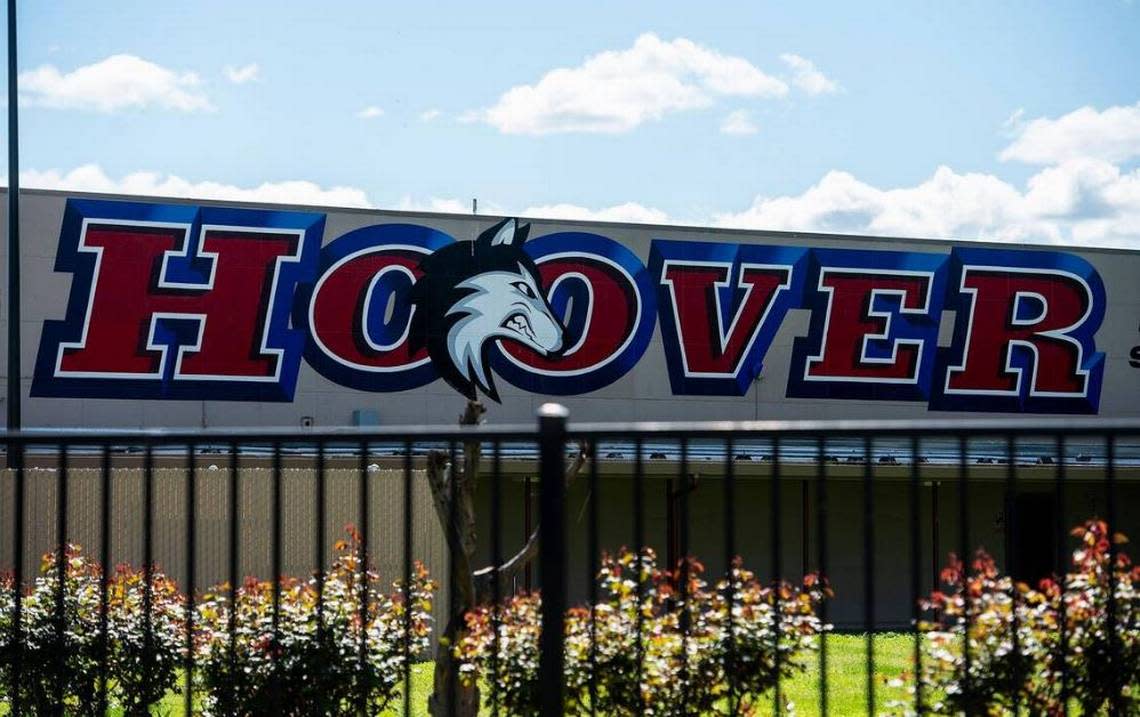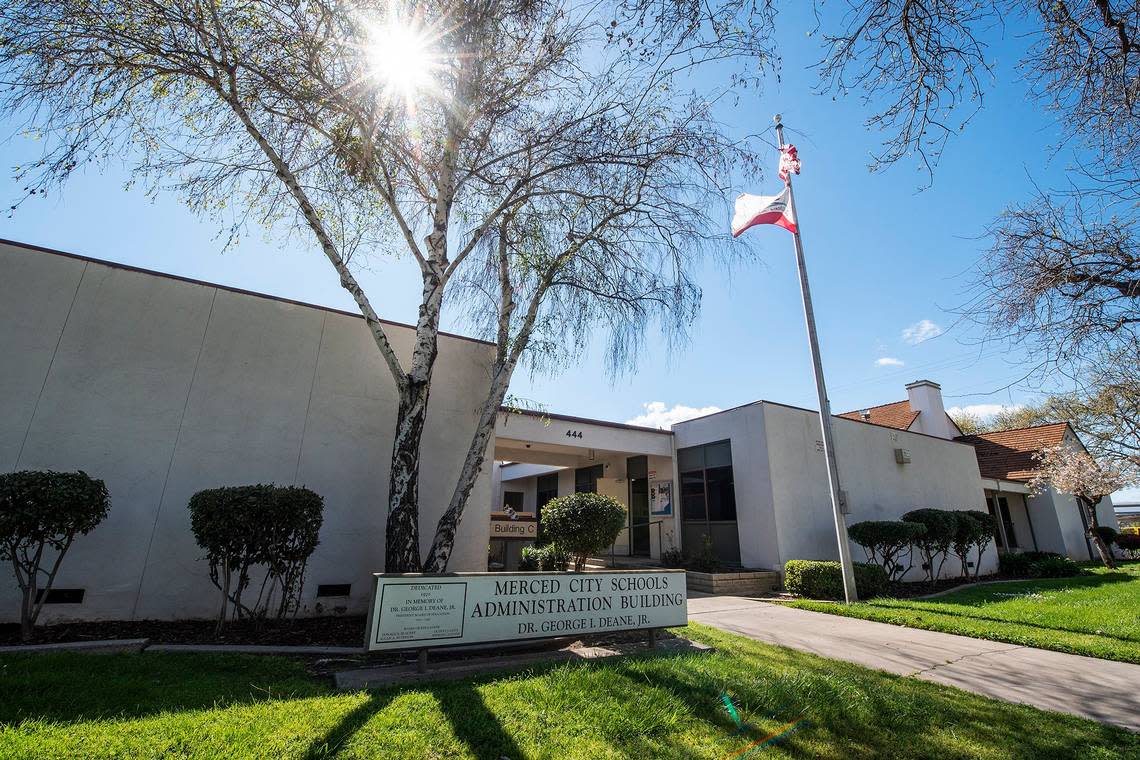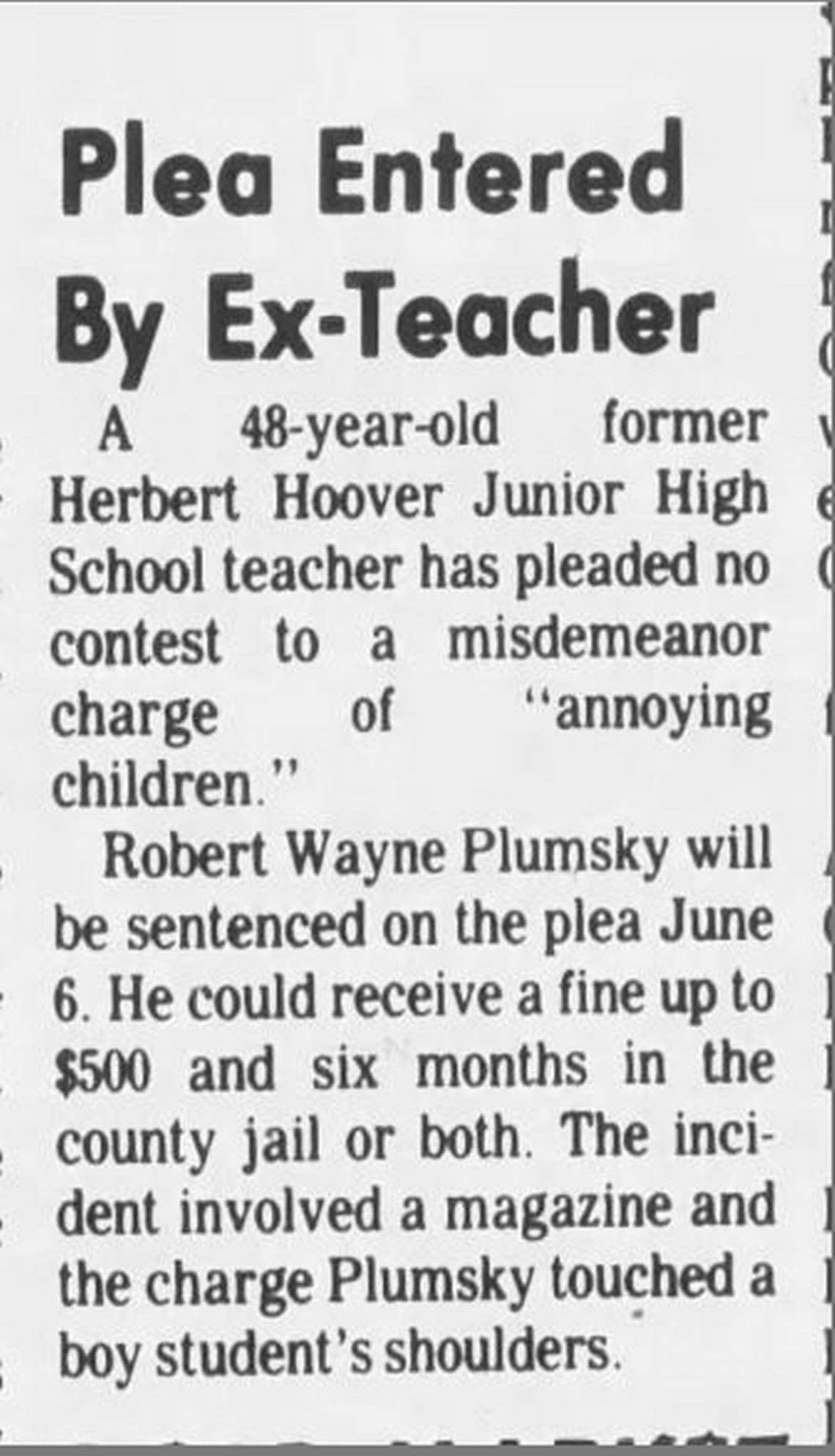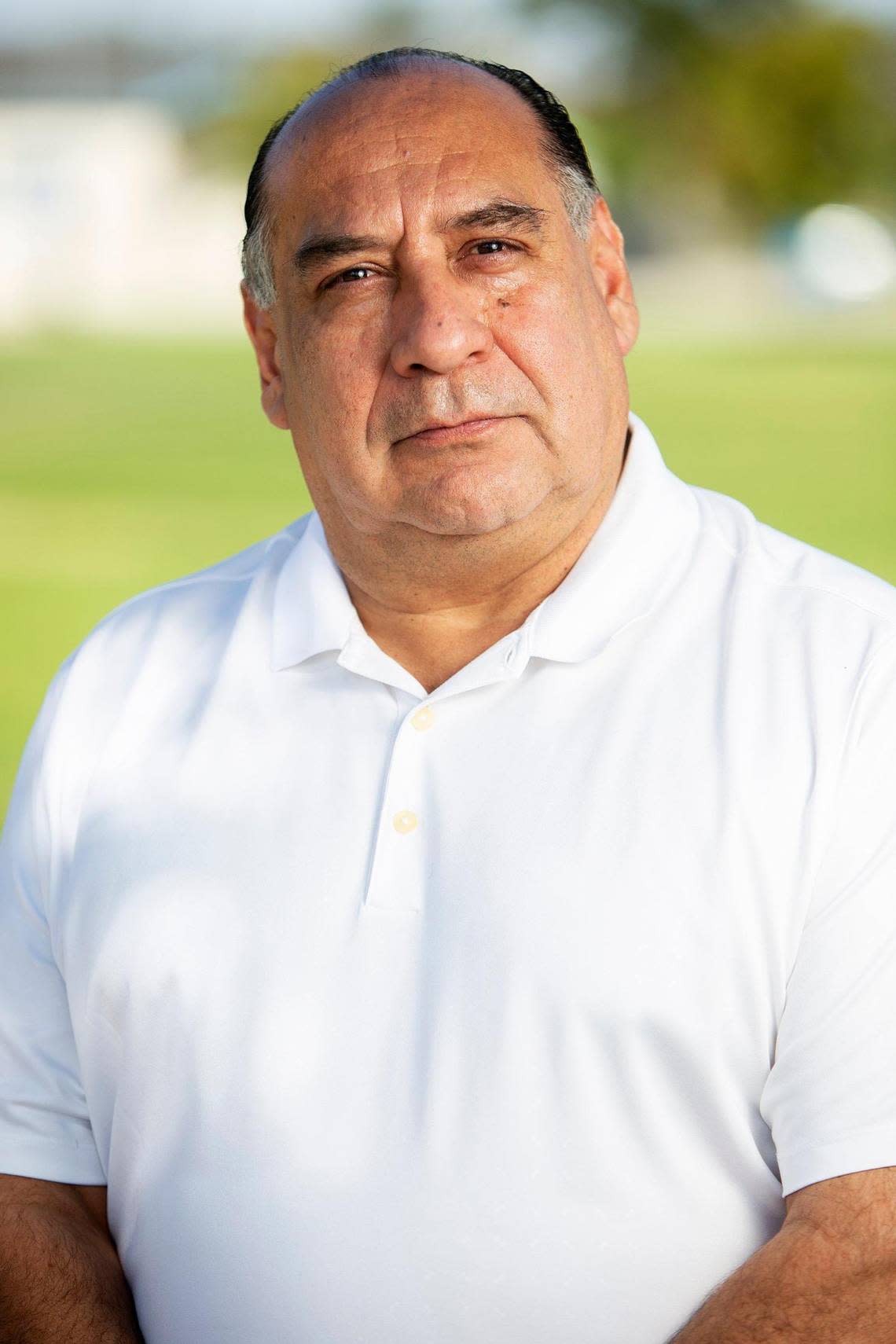Merced leader alleges sexual abuse by teacher during ’70s. He’s ready to sue under new law
A Merced City Councilmember is opening up for the first time in decades about alleged sexual abuse by a teacher while attending middle school in the 1970s.
Fernando Echevarria, who has been on the City Council since November 2018, is leveraging a fleeting window of legal opportunity to seek damages against the man he says sexually assaulted him – and the institution that’s allegedly responsible.
A legal claim filed with the Merced County Superior Court on Sept. 19 identifies as defendants former Hoover Middle School teacher Robert Plumskey and Merced City School District, Plumskey’s employer at the time.
Plumskey lost his teaching credential in 1977 not long after he was convicted on a misdemeanor charge described as “annoying children.”
Efforts by the Sun-Star to reach Plumskey, who is now believed to reside outside of California, were unsuccessful.
While it has been decades since Plumskey worked at Hoover Middle School, Merced City School District staff commented on the culture they strive to cultivate present-day.
Associate Superintendent of Human Resources Brian Meisenheimer said in a statement to the Sun-Star that the district is “committed to providing a safe and nurturing environment for all scholars.”
“An important lesson that we stress with all scholars is to speak up if ever they see or hear something that makes them uncomfortable,” Meisenheimer said in the statement.
“Teaching our children to speak up and self-advocate is an important lesson not only in our schools, but in life. Additionally when hiring and onboarding staff, our expectations include impeccable conduct when working with scholars.”
Overlooking red flags
According to the complaint, MCSD overlooked obvious red flags indicating inappropriate behavior by Plumskey toward multiple young boys at the time of the abuse.
Echevarria told the Sun-Star his intention in speaking out is to seek justice for himself and others he says were victimized.
“Primarily, the reason is to bring awareness to victims and survivors such as myself, and to bring justice to individuals who have been silenced for so long,” he said. “I think it’s beneficial so other victims and survivors can maybe come forward and bring justice to themselves.”
Echevarria, 60, says he was targeted as a 12-year-old by Plumskey in the mid 1970s.
The California Supreme Court previously ruled that individuals who were sexually abused before 2008 were required to give school districts notice of a lawsuit within six months of the date they were last abused. That law changed in 2020 with the passage of Assembly Bill 218, also known as the California Child Victims Act.
AB 218 temporarily scrapped the notice requirement and statute of limitations, giving survivors a three-year window to file a lawsuit, regardless of when the abuse occurred. The three-year period to seek legal action under AB 218 expires at the end of this year.
After more than four decades of considering coming forward, Echevarria said he decided to speak out before the window of opportunity closed.
“There was still some shame and embarrassment to the events that transpired when I was a child,” Echevarria said. “I’ve mustered up the courage here at 60 years old. I have no shame or embarrassment now.”

Potential lawsuit looms
The complaint accuses Plumskey and the school district of sexual battery, sexual harassment, negligence and negligent hiring, supervision and retention.
Echevarria is represented by attorneys from Greenberg Gross LLP and Jeff Anderson and Associates. The complaint requests a jury trial if and when the case goes to court.
After a civil case such as Echevarria’s is filed, the defendants are served the complaint. MCSD and Plumskey have 30 days to respond.
If the defendants deny responsibility, the case will move into the discovery process. Discovery helps each side understand the other’s version of the facts and evidence.
Sometimes information learned in the process helps the parties come to a settlement or resolution of the case. If no agreement is reached, a trial is set.
It could be two years before the case goes to trial, Echevarria’s attorneys estimate.
Echevarria’s attorneys say they hope the case and others like it will accomplish three things:
Force institutions such as schools, churches and daycare centers to do a better job protecting the vulnerable from sexual assault.
Empower survivors by showing them they’re not alone.
Make the experience of speaking out about past abuse easier.
“AB 218 was the California Legislature’s recognition that it takes years, or decades, for survivors of sexual assault to come forward. Often, survivors often suffer in silence and they have their voice taken away from them by the perpetrator,” said Brian Williams, one of Echevarria’s attorneys.
“(Echevarria) was a kid when this happened. It should have been different for him and the school district failed him.”

Allegations in the complaint
The case details multiple years of inappropriate behavior allegedly perpetrated by Plumskey toward multiple middle school boys at Hoover, including Echevarria.
According to the complaint, MCSD facilitated the abuse by ignoring clear signs of misconduct occurring on school property during school hours. That failure allegedly allowed Plumskey to coerce young boys into group masturbation sessions in his classroom and sexually assault multiple boys individually.
“Between 1970 and 1977, MCSD failed to keep its students safe from a sexual predator,” the complaint says. “Plumskey’s abhorrent misconduct occurred in his classroom, during school hours, and with no supervision or monitoring from any MCSD staff.”
Echevarria and other former students told attorneys that Plumskey was permitted to assemble all-male classrooms, despite all other teachers having co-educational classes. The all-boy classrooms eventually prompted concern among parents and others.
Attorneys spoke with multiple former Hoover Middle School students through the course of their investigation for the case. In addition to recalling rumors of Plumskey’s misconduct prior to his arrest, the former students also spoke of alleged abuse occurring during off-campus activities like camping trips, said Daniel Cha, one of Echevarria’s attorneys.
A document obtained by the Sun-Star shows MCSD was aware as of July 1976 that Plumskey interacted with students off campus. The letter from MCSD to Plumskey thanked him for his “extra time” working with students, but appeared to show no concern for the nature of those off-campus interactions.
The complaint says no investigation ever took place, but Plumskey was instructed to conduct co-educational classes starting the 1976-77 school year.
That change didn’t prevent Echevarria and other classmates from the alleged abuse during Plumskey’s first co-educational class.
Plumskey was still permitted to decorate his classroom with plush rugs, lounge couches and posters, in addition to playing sexually suggestive music in an apparent attempt to appeal to middle school boys, the complaint says.
During lunch time, Plumskey invited a select group of male students to attend “guy sessions” in his classroom, with the door shut and windows covered.
Allegedly, it was during this time that much of the abuse occurred.
Within the closed doors of the classrooms, Plumskey is said to have shown young male students pornographic material while making sexual comments, eventually coercing students to masturbate in each other’s presence.
Plumskey also sexually assaulted Echevarria and other boys individually, the complaint says.
Many of the south Merced students picked out by Plumskey were Hispanic or Latino. They often came from lower socioeconomic backgrounds, Echevarria said.
“It’s my opinion that he handpicked the students that he wanted to groom,” Echevarria said. “I truly believe Plumskey targeted a certain group. I was in that category at that time.”
Echevarria says he suffered the abuse fall 1976 through spring 1977, without any MCSD “monitoring, supervising, or checking in on these underage boys, or questioning why they weren’t at the cafeteria with the rest of the school, or investigating open rumors that Plumskey was distributing pornography to students,” the complaint says.
The grooming behavior by the older man initially made Echevarria feel accepted and wanted. “I felt that I was very special, because not all of the students would be in those lunch hour ‘guy talk’ sessions,” he said. “It wasn’t until afterwards that I felt remorse, shame and embarrassment, and felt victimized.”
Echevarria said he eventually began feeling increasingly uncomfortable until he hit a breaking point. He stopped going to Plumskey’s classroom during lunch, rather joining the majority of students on the playground.
But the repercussions were immediately apparent, Echevarria said. Plumskey would send students out to attempt to fetch him back to the classroom. After Echevarria kept refusing, he started getting punished more severely by Plumskey and school staff for minor transgressions, like having bad handwriting or talking in class. His grades began to suffer, too.
“My whole life at Hoover began to deteriorate,” Echevarria said. “I became very, very depressed, despondent.”
Things finally improved in 1977 when another, unnamed student reported to law enforcement that he’d been assaulted and Plumskey was arrested.
“It was like amazing grace,” Echevarria said.
MCSD teacher fired after arrest, credentials revoked
In June 1977, Plumskey was convicted in Merced court of committing a lewd act in public, a misdemeanor. In October of that year, the conviction resulted in the state Commission for Teacher Preparation and Licensing revoking Plumskey’s credentials and diploma, a document obtained by the Sun-Star shows.
A Merced Sun-Star story from May 1977 reported Plumskey pleaded no contest to a misdemeanor charge of “annoying children.”

Echevarria said his mother saw the story in the newspaper and asked him whether he’d been targeted by Plumskey. Unable to talk about it at the time, Echevarria downplayed what happened to him and didn’t tell her about the sexual abuse.
Echevarrria alleges in his complaint that even after Plumskey’s arrest, MCSD took no further action to investigate the abuse, question potential victims or offer assistance to survivors.
“MCSD simply pretended as if nothing happened, covering up the true scale of Plumskey’s abuse and MCSD’s culpability,” the complaint says.
The complaint accuses the district of sexual harassment, negligence and negligent hiring, supervision and retention. Plumskey is accused in the complaint of sexual battery and sexual harassment.
Moving forward
Echevarria said he has since realized what happened to him as a boy wasn’t his fault, saying he has made strides in overcoming the shame and embarrassment he felt for years.
Still, he said the abuse affects him to this day.
Although he recognizes that many aspects of the school system have changed since he was a student, Echevarria said similar abuse still persists.
In speaking out about his past, Echevarria hopes to encourage other long-silenced voices like his to be heard by taking advantage of AB 218.
“Now is the time to come forward before this window of opportunity closes up and you won’t be able to seek justice,” he said. “In my opinion, there should not be a deadline. But there is.”
Attorneys Cha and Williams told the Sun-Star that after conducting a thorough investigation of the allegations, they feel confident about the lawsuit’s fate in the courts.
In bringing the case forward, Echevarria acknowledged that some people might dismiss his allegations of abuse.
“I think that’s very hurtful, and I think that prevents a lot of victims from coming forward,” he said. “If they don’t believe me, hey, that’s their problem. It’s for the courts to make that final decision.”

